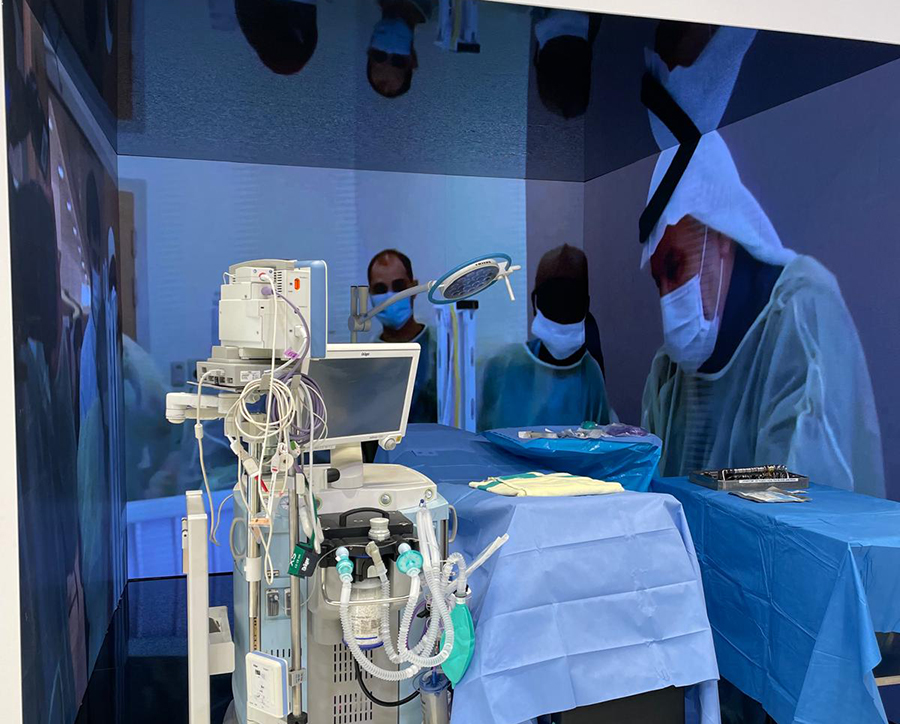The birth of conjoined twins can turn a hoped-for blessed event into a constant struggle against medical and social challenges. A group of Saudi surgeons who have been able to change the lives of these twins and their families are seeking to help other doctors combat this rare disease.
After performing 61 successful surgeries to separate conjoined twins, the Saudi Conjoined Twins Programme, the world’s leading program tackling this challenge, hosted the largest-ever conference on the topic in Riyadh, Saudi Arabia on Nov. 24-25.
Known for its leadership in energy, Saudi Arabia uses its oil revenues to take leadership in several humanitarian causes as well, including helping conjoined twins. More than an act of ESG support, the development of Saudi Arabia’s excellence in medical specialties also dovetails with Vision 2030, an effort focused on economic diversication to wean the country off dependence on fossil fuels.
The conference was designed to help spread this success globally.
Some 2,000 attendees joined, including other centers specialized in conjoined twins surgery, like Great Ormond Street Hospital in London and Baylor College in Texas.
“This is the first conference of its kind of this magnitude,” said His Excellency Dr. Abdullah Al-Rabeeah, the world’s leading surgeon in the field and the convener of the conference. “The response and attendance was more than we expected. That is why we’re recommending a repeat of this conference, holding it every 3-5 years.”
An important moment
The first International Conjoined Twins Separation Conference brought global recognition to this important issue, including a UN declaration of Nov. 24 as World Conjoined Twins Day, and an address from Dr Tedros Adhanom Ghebreyesus, Director General of the World Health Organization (WHO).
The gathering included involvement of several formerly conjoined twins, testimony to the improvements enabled by separation surgery.
The conference also saw the announcement of nearly $15 million in humanitarian initiatives, including plans for an Inclusive Website & Registry for Conjoined Twins Globally, a partnership between King Salman Humanitarian Aid and Relief Centre, UNICEF, and WHO. The portal will be the first-ever digital registry for the conjoined twin community, enabling data collection, cross-border medical collaboration, and cutting-edge research, and creating a model for other rare disease communities.
Just as important, Dr. Al-Rabeeah explained, the conference helped to drive medical progress.
“Everybody brings their own innovation. We share our knowledge, and everyone benefits,” he said.
The advances presented were impressive, and the knowledge shared at the conference will be improving surgeries over the next 5-10 years, Dr. Al-Rabeeah predicted. Much of the knowledge came from Dr. Al-Rabeeah’s own program in King Abdullah Specialized Children’s Hospital in King Abdulaziz Medical City in Riyadh.
Since 1990, Dr. Al-Rabeeah and his team have reviewed 143 cases from 26 countries before conducting their 61 successful surgeries—more than anywhere else in the world. Dr. Al-Rabeeah describes it as gratifying work that changes the lives of his patients and their families.
“I’ve been with the twins for almost 35 years. If I could go back in time and you ask me if I would do it again, I would say yes, absolutely,” he said.
Building expertise from the first case
It all began with an act of charity from Saudi King Fahd bin Abdulaziz Al Saud.
“Back in the early 90s, there was a set of conjoined twins from Sudan and the family were making a plea for help from the world. They asked our King, and his majesty asked for a medical opinion,” Dr. Al-Rabeeah explained.
Dr. Al-Rabeeah, whose career has included acting as Saudi Arabia’s minister of health between 2009-2014, was already a well-known surgeon at the time and was asked to perform the consultation.
“Of course you cannot give a medical opinion based on what you read on paper. We had to see the patient, so we called the twins from Sudan, and the trip was paid for by His Majesty,” the doctor said. “We studied the patients and learned about their condition for two or three months. After we had done enough research, we were able to attempt the surgery. We succeeded, and that stimulated the government to give more support.”
The Saudi government has covered travel costs for twins and their families and paid for all of the medical costs of those treated by Dr. Al-Rabeeah’s team.
With the government’s support, Saudi Arabia developed the expertise and infrastructure needed for successful surgery to separate conjoined twins, and Dr. Al-Rabeeah and his team became the leaders in this procedure.
“The infrastructure in our hospital is excellent. More important is having a dedicated team with experience from more than three decades of work,” Dr. Al-Rabeeah said. “This has made us perhaps the most capable center in this area.”
Complicated and rewarding work
Conjoined twins are rare, occurring “in approximately one in every 75,000 births, often resulting in miscarriage, stillbirth, or early death due to severe congenital disabilities,” according to an announcement of the conference in the Lancet.
The work of separating conjoined twins can require multiple phases of surgery lasting more than 12 hours , or in some cases several days. As Dr. Al-Rabeeah explained, shared organs must be separated, so they can allowed to regrow, sometimes through grafting. In the case of kidneys a transplant is a possibility.
As time has shown, once separated, the twins can go on to lead healthy, happy lives.
For the families of young twins, the happiness begins right after the surgery, according to Dr. Al-Rabeeah.
“We see all kinds of reactions,” he said. “When the children go into surgery, they go in on one bed, and when they come out, they are in two beds. The parents are delighted and confused, because they don’t know what to do. The daddy and mommy don’t know which child to go to, whether to go to one bed or the other, or to hug the staff. It is very rewarding to see.”
The doctor’s prescription
“We must continue to prioritize the needs of conjoined twins and others with rare diseases in our global health agendas,” Dr. Al-Rabeeah said in concluding remarks at the conference. “Through collaboration, innovation, and compassion, we can provide these individuals with the care and support they deserve, enabling them to live dignified and fulfilling lives.”
In an interview, he also offered advice to parents everywhere.
“If I could share one message with the public, I would stress the importance of early antenatal care for mothers,” Dr. Al-Rabeeah said. “If we can identify the problem with a screening within 9-10 weeks of gestation, we can do much more and it is much easier to help the twins.”














